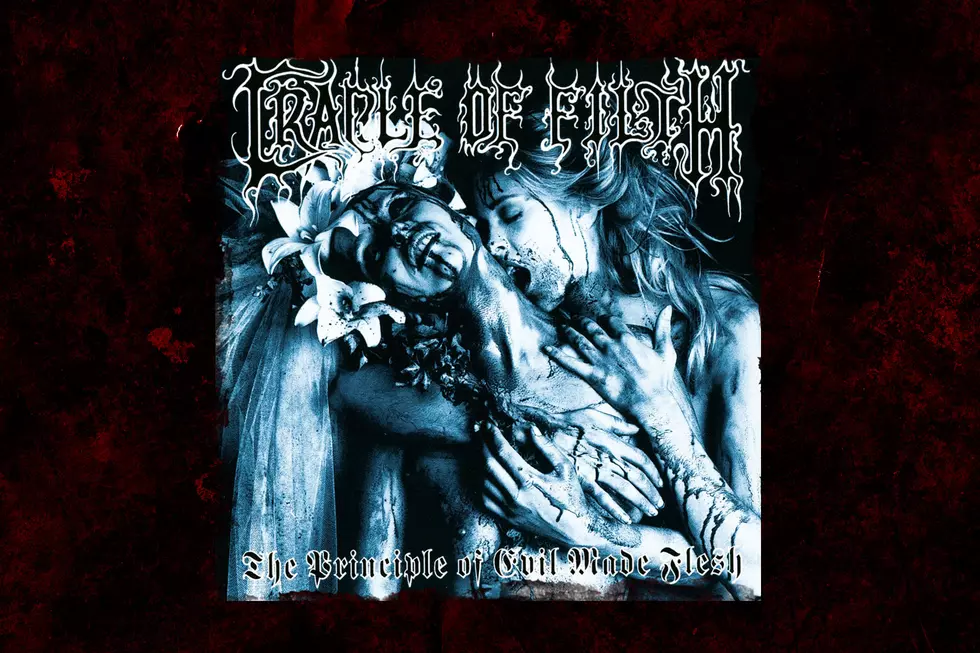
29 Years Ago: Cradle of Filth Make Their Debut With ‘The Principle of Evil Made Flesh’
Years before they played orchestral, convoluted gothic / black metal and titillated rebellious fans with slogans like “Jesus is a C--t,” Cradle of Filth were a novel, literate death metal band that played straightforward chainsaw riffs and relied on classical-influenced keyboard passages to provide atmosphere, not drive the songs. The group’s first album, The Principle of Evil Made Flesh, which came out Feb. 24, 1994, is raw and simple, but not icy or nature-influenced enough to qualify as genuine black metal.
That doesn’t mean it’s not a visceral or innovative. In fact, the scarcity of tremolo riffs, sepulchral shrieks and perpetual blast beats makes it a more enticing debut than many albums by Nordic bands the underground was fawning after. At the same time, compared to the handful of death metal demos that preceded it, The Principle of Evil Made Flesh is a leap further into the black.
The album was written through much of 1993 and tracked from September to November at Academy Music Studio in Dewsbury, West Yorkshire, England. While the band recorded with producer, Robert “Mags” Magoolagan, who had previously worked with majestic doom bands including My Dying Bride, Anathema and Paradise Lost, Magoolagan was unable to capture the huge sounds that frontman Dani “Filth” Davey was envisioning.
“We were aiming for a really moody, dramatic vibe that had become synonymous with the British metal scene, but at the same time we wanted the ferocity of the European scene,” Filth told Kerrang! in 2008. “It ended up being a very underground record, but we weren't actually trying to do that. We wanted to make a very big sounding record and I think even to this day it's a record with a very unique flavor.”
Influenced more by British Hammer horror films and romantic poetry than pagan rituals and church burnings, Cradle of Filth were a new kind of band, though their anti-religious agenda and stage attire caused many to lump them in with groups like Emperor, Immortal and Mayhem. Contributing to Cradle’s iconoclastic flavor are Filth’s lyrics, which stray from the primitive ranting of many Nordic bands and exhibit the singer’s penchant for flowing poetry. In the title track, he shrieks, “The Liliot suckle on her fruitful breasts, and yield the swords that sever and stain / There will be no act or passion wrought. That shall not be attributed to her names.”
The lyrics, along with the keyboards that fill the intros and accompany the buzzsaw guitar riffs, lend a gothic flavor to the album that Cradle of Filth built upon for subsequent releases. At the same time, the rhythms are unrelenting and savage, demonstrating the brutality of which the band was capable. Nick Barker’s drumming is precise and slamming and the dual guitar work of Paul Ryan and Paul Allender is fierce and menacing.
While both departed the band before the release of 1996’s Dusk and Her Embrace, Allender returned for 2000’s Midian and remained with Cradle of Filth until 2014. At present, Filth is the only original member from the lineup for The Principle of Evil Made Flesh, though considering how many lineup changes the band has undergone and how many musicians have left and returned, there’s no pact that would prevent another musician who played on the album from returning.
To some black metal fans, The Principle of Evil Made Flesh is the only Cradle of Filth album worth listening to, but for those who were willing to roll with Filth’s flamboyant presentation and penchant for experimentation there would be many more eclectic and gothic delights to come.
Loudwire contributor Jon Wiederhorn is the author of Raising Hell: Backstage Tales From the Lives of Metal Legends, co-author of Louder Than Hell: The Definitive Oral History of Metal, as well as the co-author of Scott Ian’s autobiography, I’m the Man: The Story of That Guy From Anthrax, and Al Jourgensen’s autobiography, Ministry: The Lost Gospels According to Al Jourgensen and the Agnostic Front book My Riot! Grit, Guts and Glory.
See Dani Filth in 14 Rock + Metal Musicians With Insane Vocal Ranges
Best Death Metal Album of Each Year Since 1985
More From Rock 108










